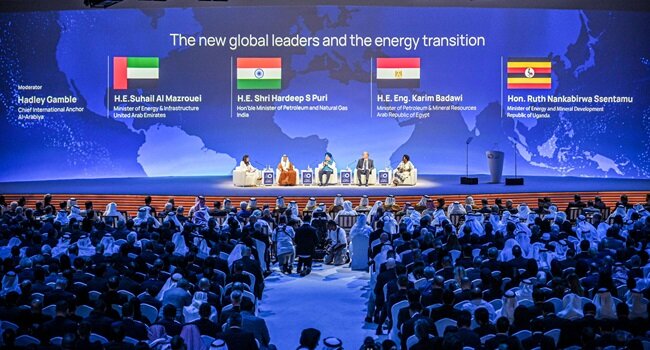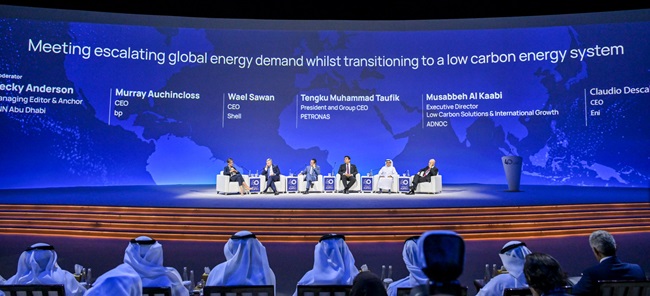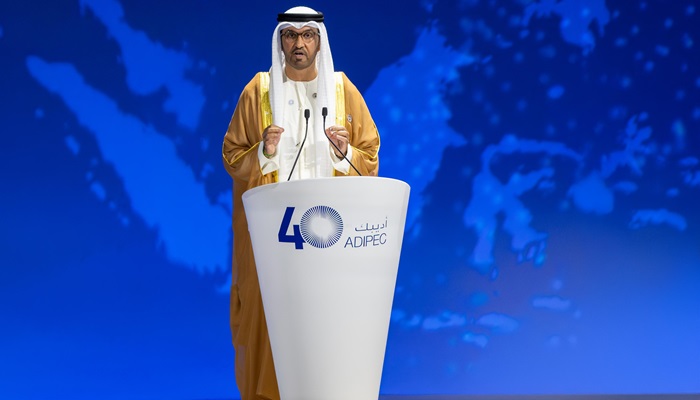- ADIPEC 2024 kicks off in Abu Dhabi with a powerful message from Sultan Al Jaber, rallying the energy industry to lead the world to the next phase of sustainable socioeconomic growth.
- Opening Ministerial and CEO panels confront urgent energy transition challenges and commit to collective action for a secure, equitable, sustainable energy
- Day 1 highlights include discussions on the intersection of energy and AI, driving investment in new technologies and fostering cross-border partnerships that can accelerate
Abu Dhabi: ADIPEC 2024 opened today, marking 40 years of energy stewardship by uniting world leaders under the theme of “Connecting Minds. Transforming Energy.”
His Excellency Dr Sultan Ahmed Al Jaber, UAE Minister of Industry and Advanced Technology and ADNOC Managing Director and Group CEO, delivered the opening address and rallied the energy industry to lead the world to the next phase of sustainable socioeconomic growth. He called on the industry to capitalise on the opportunities of the global megatrends and said that harnessing the megatrends require unprecedented cross sectoral integration to accelerate sustainable growth.
“We stand at the dawn of a new era of hope and possibility, defined by three megatrends: first, the rise of the global south and emerging markets. Second, the transformation of energy systems, and third, the exponential growth of Artificial Intelligence. These three megatrends present mega opportunities that demand mega solutions. By 2050, 1.7 billion people will join our planet, mostly in the Global South. As a result, energy markets must shift and grow and energy systems must be transformed.”
Being held in Abu Dhabi from 4-7 November, ADIPEC 2024 is expected to gather over 184,000 attendees. More than 40 ministers and 200 global C-suite executives will be among the 1,800-plus speakers who will contribute to the 370-plus conference sessions.
These varied global perspectives will address key energy transition priorities, emphasising the need to embrace transformational solutions such as artificial intelligence to empower lives around the world and drive global sustainability and prosperity.
The event’s commitment to innovation and cross-border collaboration was further affirmed during ADIPEC’s first Ministerial Panel, titled ‘The new global leaders and the energy transition’, which addressed the role of policy and cross-border cooperation in shaping the energy transition and expanding access to groundbreaking climate technologies.

The session heard insights from His Excellency Suhail Mohamed Faraj Al Mazrouei, Minister of Energy and Infrastructure, United Arab Emirates; His Excellency Shri Hardeep S Puri, Minister of Petroleum and Natural Gas, India; Honourable Ruth Nankabirwa Ssentamu, Minister of Energy and Mineral Development, Republic of Uganda; and His Excellency Karim Badawi, Minister of Petroleum and Mineral Resources, Arab Republic of Egypt.
His Excellency Suhail Mohamed Faraj Al Mazrouei, Minister of Energy and Infrastructure, United Arab Emirates, said: “Our leaders in the UAE have always thought of the future, and we are committed to investing in more energy resources to ensure adequate supply. We are privileged to have leadership that cares about investment in energy, and our commitment to renewables, nuclear and conventional energy will continue.”
ADIPEC also featured insights from private sector leaders, as they explored the difficulties of balancing business priorities and rising energy consumption with the realities of climate change.
During a session titled ‘Meeting escalating global energy demand whilst transitioning to a low carbon energy system’, attendees heard from the energy industry’s top executives, including Murray Auchincloss, CEO, bp; Wael Sawan, CEO, Shell; Tengku Muhammad Taufik, President & Group CEO, PETRONAS; Claudio Descalzi, CEO, Eni; and Musabbeh Al Kaabi, Executive Director, Low Carbon Solutions & International Growth, ADNOC.
Wael Sawan, CEO, Shell, shared his company’s approach to the energy transition: “We fundamentally believe that the world needs much more energy, and specifically more diversified forms of energy. As a company, we must be very clear about where we can invest our capital. Decarbonising our existing assets is the first step, and the next step in this process is changing our operations.”
The world’s leading international energy organisations also made important contributions throughout day one, leveraging their unique experiences with global cooperation and energy diplomacy to outline the collective efforts required to accelerate wide-scale decarbonisation in every corner of the world.
Brian Sullivan, CEO, IPIECA, said “Our industry has the skills, expertise and experience to address the issues surrounding the energy transition, and we must bring together our drive to enhance the environmental and social performance of oil and gas, integrating energy transition with sustainable development.”
The new Finance and Investment Conference provided a platform for leaders from government, finance, and energy to discuss the disparity between capital flows and the investment necessary for a fair and equitable transition. This was summarised in a panel on “Bridging the gap: energy and financial cross-sector collaboration to advance new projects”, by Reinhard Florey, CFO, OMV:
“There are specific energy solutions for which we need capital. However, there is also an extended value system that we need capital support on. These extended networks, such as infrastructure, need to be built, and we encourage lenders to consider this opportunity. It takes a lot of specialist know- how to make the technology work, but it also takes the right infrastructure.”

AI remained a critical focus of ADIPEC 2024, as this year’s event featured the all-new AI Zone, where industry experts and business leaders showcased the technology’s power to revolutionise energy systems, enhance grid resilience and unlock new investment opportunities.
With AI set to play a critical role in our energy future, ADIPEC will serve a critical platform for accelerating investment and collaboration around this transformative solution, building on 40 years of fostering innovation and sustainable progress in the global energy transition.










































